Peg Herring's Blog, page 12
August 22, 2016
Why Do You Write Mysteries?
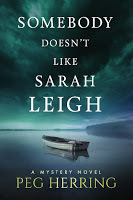 Why Do You Write Mysteries?
Why Do You Write Mysteries?I get asked that question a lot, so I've thought long and hard in order to be able to come up with a good answer. Here it is.
I don't really know.
Why do you read mysteries? might be a place to start. If we can agree that we read mysteries because we enjoy having a puzzle to solve, like seeing characters tossed into unusual and often dangerous situations, and feel satisfied when everything works out in the end, then I guess the logical extension of that, at least for someone who likes to write, is attempting to create her own mystery.
I like coming up with unique characters: a homeless woman, a dead P.I., a famous princess/queen. I like salting the plot with clues, both false and real. I like filling in details once the main story is in place and adding subplots like the relationships among sisters or the joys of growing up in a small town. I get to know my characters through a series, so my mind stops me if I try to make a woman or even a dog do something that isn't in her nature.
So why do I write mysteries? Well, it's great to have people write to tell me they enjoy them. When I opened my email this morning, there was a glowing review from a woman who'd listened to one of my books, nine hours of audio, in one day. That's a great complement to that first cup of coffee!
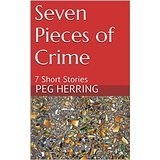 Mostly I write mysteries because I read them, love them, and am always looking for another good one. If I write it, that's okay too.
Mostly I write mysteries because I read them, love them, and am always looking for another good one. If I write it, that's okay too.
Published on August 22, 2016 04:11
August 15, 2016
Why Did the Amateur Sleuth Cross the Road?
Unless an author writes only police procedurals and P.I. novels, the question of why the protagonist gets involved in the mystery is present. I've never in my life wanted to investigate a murder, and I'm guessing most readers would say the same. We trust the police to do an adequate job, and while we might grumble that they didn't turn every stone in a specific case, we seldom jump in to help.
If you're going to write a mystery with an amateur sleuth, he or she has to have a reason to get involved that departs from what is good behavior and good sense in real life.
 Loser wants to help the father of a little girl who reminds her of her daughter.
Loser wants to help the father of a little girl who reminds her of her daughter.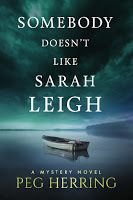 Caroline is suspected of killing her former best friend.Many authors choose to have their protag or someone close to him as the suspect. This is certainly a driving force, as long as the rules of logic are applied. If you're accused of murder, are the people involved in the case likely to sit down with you and talk about it? And why would they be honest? It isn't like you can arrest them for perjury. If you testified in court that someone confessed to you, his lawyer would have you for lunch. "So you are a suspect in this case, but you want us to believe that Mr. X confessed to you that he did it. How convenient for you!"
Caroline is suspected of killing her former best friend.Many authors choose to have their protag or someone close to him as the suspect. This is certainly a driving force, as long as the rules of logic are applied. If you're accused of murder, are the people involved in the case likely to sit down with you and talk about it? And why would they be honest? It isn't like you can arrest them for perjury. If you testified in court that someone confessed to you, his lawyer would have you for lunch. "So you are a suspect in this case, but you want us to believe that Mr. X confessed to you that he did it. How convenient for you!"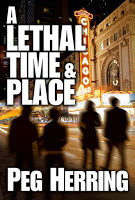 Four vagrants witness a murder but can't report it to the police.
Four vagrants witness a murder but can't report it to the police.Another scenario is that the protagonist has special knowledge of the crime that he can't/won't share with the police, or he shares his info and they ignore it. If that were so, I suspect most of us would rationalize our way out of investigating on our own. "Well, yes, I did see Mr. X leaving the scene of the crime, but the police asked him about it, and he claims he was in Hoboken." End of story. Most of us don't have the time, the temperament, or the drive to chase down criminals. We'd grumble, "Nobody ever listens to me," and forget about it.
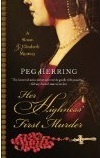 Princess Elizabeth wants to stop a killer.Finally, there's the nosy protagonist who simply can't stay out of other people's business. I find these the hardest to relate to, and I've given up on books when the amateur sleuth's pushy behavior didn't make sense. The book I'm reading right now comes close, with a woman who travels all over England questioning people about a death she has no connection to. Her family keeps telling her not to do it, and she's been attacked several times now, but she's determined (dad-gum-it) and just won't stop. Luckily the author presents her as determined and stubborn, so her refusal to give up is at least tenable.
Princess Elizabeth wants to stop a killer.Finally, there's the nosy protagonist who simply can't stay out of other people's business. I find these the hardest to relate to, and I've given up on books when the amateur sleuth's pushy behavior didn't make sense. The book I'm reading right now comes close, with a woman who travels all over England questioning people about a death she has no connection to. Her family keeps telling her not to do it, and she's been attacked several times now, but she's determined (dad-gum-it) and just won't stop. Luckily the author presents her as determined and stubborn, so her refusal to give up is at least tenable. In defense of authors, we need a story, the story needs a protagonist, and the protagonist needs to keep going when the police either stop investigating or never really begin. My concern is with how well the author sets up the story. In the beginning, can I believe this person would take up the challenge of a murder investigation, and as we go onward, do I still like him or her because of it?
Published on August 15, 2016 04:13
August 8, 2016
Garden Tools We Need to Invent

Edible things are starting to appear in our garden (through John's efforts alone these days) and it occurs to me there are some things Science could invent to help gardeners:
Leaf-penetrating radar: for finding all those cucumbers that hide until they're too fat to use
Underground MRI: to show which carrots, beets, potatoes, etc. are big enough to pull
Rodent-discouraging pods: Before we get to them, critters have chewed a hole and taken out all the peas.
Shaper for peppers: The ones from the store are perfectly formed. Ours taste better, but they look like some weird science experiment.
Shut-off valve for cherry tomatoes, green beans, and zucchini: We're so excited for the first ones, but by mid-August we're desperate to give them away. Don't stop to ask for directions--you'll leave with a car full of vegetables!

You probably have suggestions too if you're a gardener.
Published on August 08, 2016 04:10
August 1, 2016
Stuck on Historicals
![The Tilted World: A Novel by [Franklin, Tom, Fennelly, Beth Ann]](https://i.gr-assets.com/images/S/compressed.photo.goodreads.com/hostedimages/1470183678i/19898700.jpg)
For some reason I ended up with a bunch of historicals at my last visit to the bookstore. It could be that there are a lot of them out there, and it could also be that I'm drawn to them. Here's what I've got:
The Museum of Extraordinary Things by Alice Hoffman-I'd read good things about this one, and I did enjoy the gradual narrowing of the distance between the two protagonists. Lots of interesting stuff about the times, when it was perfectly okay to display "freaks" and pretend it was science--although I guess today we do the same thing through television and pretend it's altruism.
A Burnable Book by Bruce Holsinger-This one isn't for the casual reader of historicals. Like Hilary Mantel's work, it's a book that immerses one in the time, with references to real people the reader is expected to recognize and words I wouldn't have known except for good old Dr. Calver's Chaucer class back at U of M many decades ago. I had to wade through dark passages and shifting points of view, both first person and third, for a while before I began to care about anyone in the slowly-emerging story. I also am not sure the premise of the mystery fits the machinations involved. Still, I'm far enough along that I'll stick with it and see where it all ends up. (After all, Chaucer himself is a character.) The author definitely has a gift for description, and he knows the period. This reader can almost feel the grit of medieval times beneath her fingernails.
My favorite of the bunch is The Tilted World, by Tom Franklin and Beth Ann Fennelly. The book has it all: the disastrous flood of 1927 in the southern United States, a love story, characters I cared about, moonshine, revenuers, and lots of action. There was one suspend-your-disbelief moment, but it had to happen somehow to close the story arc, so I was okay with it. As I read, I kept imagining this book as a movie, and it would be a good one.
I still have Jessie Burton's The Miniaturist on the shelf; then it's on to Laurie King's The Murder of Mary Russell. I like her books, so it should be a good week!
Published on August 01, 2016 04:48
July 25, 2016
In Defense of Cozies
 Upcoming Release of a Series I EnjoyWhen authors get together, there's a tendency to disparage cozy mysteries, and many of my friends think of themselves as "just" cozy writers. To be honest, cozies can get pretty silly, with amateur sleuths bumbling through situations that no sane person would put herself into. Often they have only the faintest of reasons to do so, and most of us would have called the police, told them our suspicions, and gone back to canning green beans.
Upcoming Release of a Series I EnjoyWhen authors get together, there's a tendency to disparage cozy mysteries, and many of my friends think of themselves as "just" cozy writers. To be honest, cozies can get pretty silly, with amateur sleuths bumbling through situations that no sane person would put herself into. Often they have only the faintest of reasons to do so, and most of us would have called the police, told them our suspicions, and gone back to canning green beans.So why do zillions of people read zillions of cozies each year?
Possibly because we trust them.
We trust cozies to provide a few hours of entertainment that won't depress us, scare us, or force us to ponder the darker side of humanity. Cozy villains might be a little papery, but we don't imagine them showing up in our bedrooms with a butcher knife or shadowing us in a dark parking garage as we hurry to our cars.
It might be my age, or it might be TV's predilection for long-running segments on cop series where a single crazy-but-oh-so-clever killer menaces the hero and his/her family and friends for months, even years (think Red John), but I'm tired of psychopaths. It seems dishonest to me for an author to create a character whose psychosis allows him/her to do just about anything with only his own delusional thoughts for a road map. Traditional mysteries, including cozies, rely on logic: the killer has to have a reason for what he does, and the reader should be able to believe he was pushed to the point of murder by his situation, whether by greed or hate or whichever deadly sin it turns out to be.
I also hate blood, torture, and mental anguish in books (well, actually, anywhere). When a character is helpless and the killer is standing over him with a knife, things better get more positive pretty quickly, or I'm closing that book. Many times I've stopped reading when it felt to me like the author was just seeing how sick things could get (see last week's blog), and my tendency is to not return to that author again once she's done that.
Finally, cozies restore justice in the end. The killer is caught, life in the small town returns to normal (until Book 2 or Book 22!). With 24-hour news telling us about every abnormality they can dig up, it's nice to have that Shakespearean return to order in our fiction.
Do I read cozies all the time? No. I prefer straight traditional mystery, but I'm pretty careful about who I trust to write it for the reasons listed above. I completely understand why people stick to cozies, because if you like a little murder and a good puzzle, they're comforting and comfortable.
Published on July 25, 2016 04:08
July 18, 2016
Where Do You Stop Reading?
 Last week I posted about the reader's delight: four great books I read all in a short time. Today I'd like to talk about the ones we don't finish.
Last week I posted about the reader's delight: four great books I read all in a short time. Today I'd like to talk about the ones we don't finish.My most recent "I'm not reading any more of this" book started on a weak note, but I stuck with it while the author rehashed the previous installment, figuring maybe I needed to know the stuff to get Book #2. Then the protagonist put himself in a situation where he was locked in without telling anyone or giving himself an emergency escape. I thought that was unwise, but as an author I know that we sometimes ignore what real people would do in order to make a story work. It's a story, after all.
The stopping point came in a scene that was clearly included only to shock the reader. The event had nothing to do with historical detail and didn't advance the plot an iota. It was simply degrading to the protagonist and uncomfortable for me to "watch." It was almost as if the author yelled from behind the page, "See how disgusting I can be? Now go tell your friends what a creative writer I am!"
Instead, I closed the book and put it in the discard pile.
Here's my question for you as readers? What does it take to make you close a book and decide you won't open it again?
Published on July 18, 2016 04:00
July 11, 2016
Back to Books
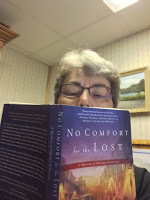 The big summer holiday is over in our little town, so we go back to doing what we do. In my case that's reading and writing. The writing was in the final phases for several pieces over the last few months and the promotion that's ongoing when a book is newly released. First it was the last Dead Detective mystery, then the fourth Sleuth Sisters (by Maggie Pill, but I'm heavily involved). After that it was finalizing the audio books for MACBETH'S NIECE (after years and years it will finally be on Audible) and the second Dead Detective mystery, DEAD FOR THE MONEY. I had to listen to them to be sure they're correct, which takes hours and hours but made me pretty happy. JoBe Cerny reads Seamus very well, and both he and the narrator for MN, Caitlin O'Connor, are great readers, especially when it comes to presenting characters with different accents, which makes their readings interesting and easy to listen to.
The big summer holiday is over in our little town, so we go back to doing what we do. In my case that's reading and writing. The writing was in the final phases for several pieces over the last few months and the promotion that's ongoing when a book is newly released. First it was the last Dead Detective mystery, then the fourth Sleuth Sisters (by Maggie Pill, but I'm heavily involved). After that it was finalizing the audio books for MACBETH'S NIECE (after years and years it will finally be on Audible) and the second Dead Detective mystery, DEAD FOR THE MONEY. I had to listen to them to be sure they're correct, which takes hours and hours but made me pretty happy. JoBe Cerny reads Seamus very well, and both he and the narrator for MN, Caitlin O'Connor, are great readers, especially when it comes to presenting characters with different accents, which makes their readings interesting and easy to listen to.While I was doing all that, I was still reading--I'm always reading. Last week I had four books going that were all very good. First was WILDE LAKE by Laura Lippmann. I expect great things from her, and she never disappoints. I also read a good historical, NO COMFORT FOR THE LOST, by Nancy Herriman, a woman I met at this year's Printers' Row in Chicago. Steve Hamilton's acclaimed new book, THE SECOND LIFE OF NICK MASON, is a good read, though more to John's tastes than mine. The protag didn't engage sympathy or empathy in me, so it was in the "good story" category but failed to engage much concern for Nick's future. I'm about to finish DANGEROUS PASSAGE by Lisa Harris, which is a good police procedural if a little heavy on "Will God send a man to love me?" angst. I recently started Bruce Holsinger's A BURNABLE BOOK, which isn't for those not really into medieval detail. It took me a while to get into the story, but Geoffrey Chaucer is in there, so I stuck with it, and it's becoming clearer what's going on now.
So that's my life. I write, I read, I get books ready for other people to read. It keeps me out of trouble...most days.
Published on July 11, 2016 04:48
July 5, 2016
That Whole Holiday Thing
 Moran Ironworks' Entry in this year's paradeHolidays serve many purposes, and IMHO, most of them are essential to humanity.
Moran Ironworks' Entry in this year's paradeHolidays serve many purposes, and IMHO, most of them are essential to humanity.I say most because I'm not a big fan of the "it's a holiday so let's get drunk and do stupid stuff" mentality. Otherwise, I heartily approve of celebrating.
Holidays bring remembrance: Independence Day, Veterans' Day, Valentine's Day, Father's Day, whatever the "day," we pause to pay tribute to those who do or did their job well. That's a good thing, reminding us there's good in the world and giving us a chance to express gratitude for it.
Holidays bring us together: Yesterday our little town, whose streets are usually empty and whose businesses gasp for sustenance, was deluged with celebrants who come "home" each year, supposedly to watch the parade but really to ask "Who's around this weekend?" As a long-time, long-retired teacher, each year I get introduced to dozens of offspring, some of whom are even a tiny bit impressed that the woman who once taught their parent can still toddle down the street and make semi-intelligent conversation. We meet family and neighbors we don't see often enough in this age of not-visiting. We run into people we went to school with. We chat with those we once worked alongside and those who were for some brief time in the past part of our orbits before those orbits moved in another direction. It's all very cool.
Holidays allow us to do as little as possible: Because the day is set aside for celebrating, we don't have to make that to-do list. We don't run to the store to pick up a few things. We can allow ourselves the luxurious necessity of having nothing of importance to do.
And holidays remind us of the circle of life (cue African drums). As we gather around the table or on the street, we see each other growing older. We start taking into account how much Grandpa (or Aunt Bernice or even ourselves) will be able to do in a given day. Each year's celebration is similar, but each is a little different from the last. Familiar faces are missing. New faces peek out from strollers or over Daddy's shoulder. On the first Fourth of July after my mother died, I recall the shock I felt as we parked our car and walked toward the parade route. I had a sudden "I shouldn't do this without her moment." Of course I did, because I had to. Over the years we learn to approach holidays without our parents, our siblings, even our children with a feeling that it isn't the way it should be. Those empty spots are reminders that life doesn't last forever.
I hope your holiday was great, with remembering, family and friends, relaxation, and a little moment of realization that it won't always be like this. That's the way life is.
Published on July 05, 2016 04:34
June 27, 2016
The Cruelest Word of All
 Yes, those are sharks!I won't keep you in suspense. It's they--the little pronoun separates you from others.
Yes, those are sharks!I won't keep you in suspense. It's they--the little pronoun separates you from others. They means "those not like us." They marry their children off at nine. They don't value human life. They believe they'll go immediately to heaven if they take non-believers with them when they die.
Let's turn that around. We go to clubs every night, where we take drugs, drink prodigious amounts of alcohol, and hook up with strangers. We think all women should strive to look like Gigi Hadid, no matter what their body type. We believe the more guns we have in our homes, the safer we are. We anticipate a heaven where we'll walk around on streets of gold, singing hymns and playing the harp.
That's not what you believe? But that's the impression those in other cultures have of you, based on songs, cartoons, sermons, media, and speeches. If it isn't you, maybe you aren't a typical American.
Or maybe there's no such thing as they.
I've griped here before about statements made concerning people of the past: They never bathed, or they thought the Evil Eye could kill a person. Not everyone believed that, not even most of everyone. If everyone truly believed in the Hell those preachers described, would there be any sin whatsoever? Like sermons of today about love and tolerance, those homilies on the "angry" God who'd dangle you like a spider over the pit of Hell must have gone in one ear and out the other, and our forefathers, like most of us, continued doing on Monday morning just as they'd done last Friday afternoon.
There isn't any they today, either. The next time someone tells you "they" want to kill us, ask yourself this question: Can you get your whole family to agree on where and when to hold the next reunion? If you can't get a group of people who are closely related to agree on that, why would you think an entire nation is united on anything?
Published on June 27, 2016 04:11
June 22, 2016
An Author's Bucket List
 Panel at Printers' Row 6-16 In the preface to Iberia, James Michener explained that he'd conceived the idea for the book decades before, made a bunch of notes about it, and then put it on a shelf because he had too many other things going. I think many authors have the same experience: too many ideas, not enough time. I always tell people I'll die with ideas for more books in my head.
Panel at Printers' Row 6-16 In the preface to Iberia, James Michener explained that he'd conceived the idea for the book decades before, made a bunch of notes about it, and then put it on a shelf because he had too many other things going. I think many authors have the same experience: too many ideas, not enough time. I always tell people I'll die with ideas for more books in my head.It takes time to make an idea into a book, which is why, though we all might have "a book inside us," we don't all write it down. It's a daunting task, and even if/when you do write it down, it needs editing and reworking, over and over. Even books that seem light, like cozies, require multiple drafts. (I know there are authors who claim to write it down only once. A: I don't believe them and B: if it IS true, I'm guessing they work it over many, many times in their heads before they make that one draft. The rest of us can't keep all that stuff inside--we'd explode.)
Some ideas are good but difficult to plot. I have a couple of books that I started and had to leave because I eother don't know where I want it to go or how I'm going to get there. A book I released last winter, DOUBLE TOIL & TROUBLE, was years in the making because it was a romance (not what I'm known for nowadays) and a sequel to MACBETH'S NIECE. I wanted to finish the macFinlaech story, but each girl's story unfolds in turns, and I hadn't been able to make them come back together in a balanced way until inspiration hit--years after I began it.
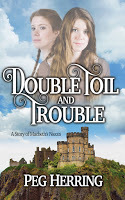
I also have ideas that are cool but I just don't have the time right now to write them. With three series going, there wasn't time to write the mystery about the woman recovering from a coma or the sequel to SHAKESPEARE'S BLOOD I'd started back when an agent first took the book on. She said, "Get to work on the sequel NOW!" I did, but I never finished it, and that agent never sold the first book, so the second one's been lying around 3/4 finished. Maybe this fall...
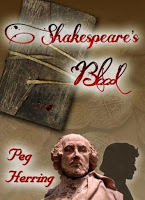
There are other ideas, some vague, some partially done. It might be true that they don't deserve to be completed if they haven't fired my imagination enough to do it, but on the other hand, I'm by necessity a compartmentalist: I work on the book I'm working on until I'm happy with it (or until a publisher is!) That means the uncompleted books on my bucket list are probably deserving, they simply have to wait their turn. Now that I've finished the Dead Detective and Loser series, and now that my publisher for the Simon & Elizabeth series has announced they won't be publishing any more mysteries, it might be time for some of the books on the bucket list to get their turn at bat.
Published on June 22, 2016 04:14



